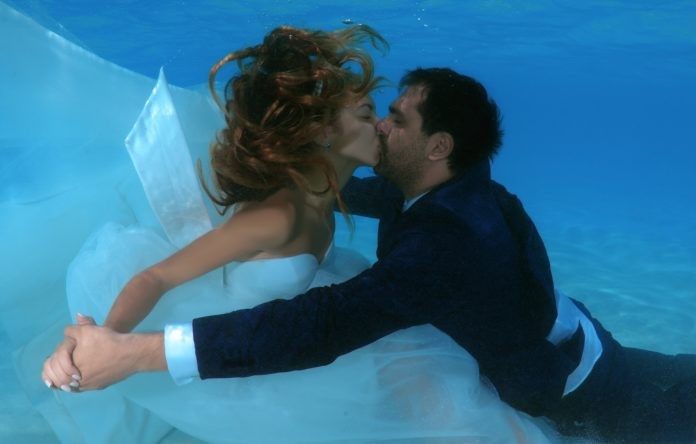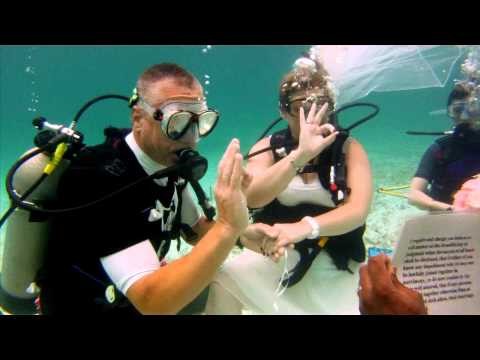Most brides-to-be spend the last few weeks before their big day anxiously checking the weather forecast for signs of rain; but for the adventurous few, topside weather doesn’t have to be a problem. Diving couples are looking to the seafloor for their perfect wedding venue; especially as the dream of getting married underwater is becoming easier to realise with more and more locations offering underwater wedding packages.
Why Get Married Underwater?
For most divers, the sport is an all-consuming passion that verges on the edge of addiction. The ocean is the place where you feel happiest, and the one where you’re most at home. If your other half also dives, it’s likely that you either met through your shared love of the sea; or that you experienced the thrill of learning to dive together. Mutual interests are a key aspect of any successful partnership, and getting married underwater is a great way to celebrate your own special connection.
Underwater weddings can also be more relaxed than the conventional above-water affairs. On a spiritual level, many divers find the ocean to be a place of peace and quietude, far removed from the stresses of everyday life and filled with natural beauty. On a practical level, getting married underwater means you won’t have to worry about expensive flowers and decor, spending a fortune on an extravagant dress, or forgetting the words to your vows.
With much of the paraphernalia of normal weddings rendered unnecessary, you’re free to concentrate on what really matters – the incredible feeling of pledging the rest of your life to the one you love. If your heart is set on a small, intimate wedding, limiting your guest list to the members of your friends and family who know how to dive is an easy way to ensure that things don’t get blown out of proportion – and that you get the wedding you really want.
Of course, one of the main reasons for considering an underwater wedding is that it guarantees the uniqueness of your big day. Instead of having an identikit ceremony that will blur with countless similar events in the memories of your friends and family, yours is sure to stand out from the crowd. It will be something that your loved ones will talk about for years to come, and if you’re blessed with children, it’ll make one hell of a story to tell the kids.

Things to Consider
For all the plus sides to getting married underwater, there are several points that require careful consideration. Safety is the most important of these – you may be a competent diver under normal circumstances, but will you be able to dive safely on your wedding day? Getting married involves a complex blend of intense emotions (ranging from acute nerves to dizzying love), and remembering to take care of practicalities like buoyancy control may be difficult.
There are also several aspects of the traditional wedding experience that are simply impossible underwater. If it’s important to you to hear the words of your loved one’s vows, getting married underwater may not be for you. Similarly, even if that white dress you’ve been dreaming of is practical enough to be worn beneath the waves, it probably won’t look so great soaking wet; while even the most talented makeup artist won’t be able to offset the obscuring effect of mask and regulator.
Making Your Wedding a Reality
If you decide that these setbacks are a small price to pay for the wedding of the decade, the first step in planning your underwater ceremony is deciding where you want to have it. Location is essential – because although the frigid waters of an inland quary (like Stoney Cove in the UK) may be closest to your heart, the reality is that it’s going to be best to choose a spot with reliably good conditions. Unless you want to fumble around in the murk for your partner, for example, good visibility is key.
Similarly, a spot with minimal current or surge is ideal, so that you can stay in one place long enough to exchange vows; while choosing a tropical location that doesn’t require nine millimetres of neoprene will make the experience more pleasant for everyone. In order to keep things as safe and as simple as possible, opt for a shallow spot with plenty of bottom time and the good natural light required for decent photographs.
Once you’ve chosen your location, the next step is to make sure that there is a professional dive centre nearby that is both willing and able to help with the logistics. Resorts in places like Monte Carlo and the Maldives have cottoned on to the underwater wedding trend, offering packages that take the stress of planning the details off your hands. If you decide to travel overseas, it’s also crucial to take care of the legalities required to make your foreign wedding official.
You’ll need to locate an officiator with a dive qualification as well as a marriage licence, and an underwater photographer capable of capturing the moment for posterity. If limiting your guest list isn’t an option (or if you really want to invite your great Aunt Sally and your second cousin Rob) you’ll also need to make provision for guests who can’t dive. This doesn’t have to be difficult – you could choose a site shallow enough for snorkellers, or have a proper reception afterwards.
Lastly, don’t forget the specialist items that you won’t find on a conventional wedding checklist. Instead of boutonnières for the groomsmen and confetti for the flower-girl, you’ll need to remember spare o-rings and mask straps in case of mishap, and dive slates prepared with pre-written “I do”s. Extra weights will make it easier to maintain your position on the seafloor throughout the ceremony, while the bridesmaids will need to stock up on waterproof mascara.


